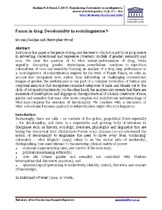Fanon in drag: Decoloniality in sociolinguistics?
Abstract
In focus in this paper is the genre of drag, and the uses to which it is put by its proponents in subverting conventional and repressive (Western) models of gender, sexuality and race. We raise the question of to what extent performances of drag, while arguably disrupting gender stereotypes, nevertheless continue to reproduce colonialities of race and sexuality. Framing an analysis of a drag king performance in a sociolinguistics of subjectification inspired by the work of Frantz Fanon, we offer an account that recognizes how, rather than subverting or challenging conventional images of gender, the performance is one part of a complex circulation of textual and corporeal semiotics that enregisters racialized categories of male and female cut to the cloth of coloniality/modernity. On the other hand, the analysis also reveals that there are moments of interruption and slippage in the reproduction of colonial constructs of race, gender and sexuality that may offer more complex and multifarious understandings of what may comprise the exercises of decoloniality. We conclude with a discussion of what a decolonial Fanonian approach to subjectification might offer sociolinguistics.

